|
|
|
Sort Order |
|
|
|
Items / Page
|
|
|
|
|
|
|
| Srl | Item |
| 1 |
ID:
103790
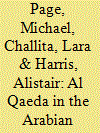

|
|
|
|
|
| Publication |
2011.
|
| Summary/Abstract |
Al Qaeda in the Arabian Peninsula has positioned itself at the vanguard of a media revolution in which terrorist groups both create and frame news events to an unprecedented extent. Through the publication of its e-magazine Sada al-Malahim (The Echo of Epic Battles), the organization has sought to mobilize both Yemeni and non-Yemeni Muslim, Arabic-speaking audiences to carry out violent jihad. This article utilizes the concept of collective action frames to analyze Al Qaeda in the Arabian Peninsula's media output, identifying the organization's grievance narratives, ideological justifications for violent actions, and means to strengthen its credibility among its intended audiences.
|
|
|
|
|
|
|
|
|
|
|
|
|
|
|
|
| 2 |
ID:
103801
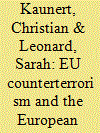

|
|
|
|
|
| Publication |
2011.
|
| Summary/Abstract |
Terrorists trained on European soil, but originating from the Middle East, attacked the world's only superpower on September 11, 2001. Countering this terrorist threat has become an increasingly significant part of European Foreign Policy. At the same time, the European Neighbourhood Policy (ENP) has become an increasingly important dimension of European Foreign Policy. This article examines the extent to which counterterrorism has occupied a prominent place in the ENP, with a particular focus on the Southern Mediterranean ENP partners. The findings of this article suggest that, despite the commonly held view in the literature that security issues, in particular terrorism, have dominated the ENP agenda, counterterrorism cooperation between the European Union (EU) and its Southern Mediterranean ENP partners has not advanced as much as might have been expected.
|
|
|
|
|
|
|
|
|
|
|
|
|
|
|
|
| 3 |
ID:
103788
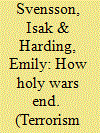

|
|
|
|
|
| Publication |
2011.
|
| Summary/Abstract |
Conventional wisdom suggests that armed conflicts with religious dimensions are inherently difficult to end. Religious appeals seem to make conflict issues indivisible. Yet, religious conflicts do end. In order to understand this puzzle, there is a need to examine the empirical records of the termination process of these types of armed conflicts. In this study, we argue that there is a potential for conflict resolution of religious conflicts without necessarily requiring concessions on the core beliefs and aspirations. We explore this proposition by examining the empirical pattern of Asian armed conflicts with explicit religious dimensions as stated incompatible positions and scrutinize how they are ended. Our empirical analysis reveals that none of the parties raising religious demands has made concessions on those demands. Yet, in about half of the cases, there are accommodations that do not imply concessions on the religious goals. Based on these findings, the study draws out the potential implications for the debate about the role of religion, armed conflicts, and peaceful resolution.
|
|
|
|
|
|
|
|
|
|
|
|
|
|
|
|
| 4 |
ID:
103792


|
|
|
|
|
| Publication |
2011.
|
| Summary/Abstract |
The article explores ideological fault lines among Sunni Muslim militants (jihadists) in Europe since the mid-1990s. It argues there have been disputes among the militants about whether to prioritize local struggles or Al Qaeda's global war, and about the legitimacy of launching terrorist attacks in European states offering political asylum to Muslims. It concludes that Europe's militants have become more ideologically unified in conjunction with the invasions of Afghanistan, Iraq, and the Mohammed drawings, seeing European countries as legitimate and prioritized targets, and identifying with Al Qaeda.
|
|
|
|
|
|
|
|
|
|
|
|
|
|
|
|
| 5 |
ID:
103799
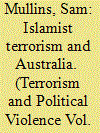

|
|
|
|
|
| Publication |
2011.
|
| Summary/Abstract |
Australian interests have been considered viable targets for Islamist terrorists since at least 2001, and Australians have suffered from attacks in Bali in 2002 and 2005, and Jakarta in 2004 and 2009. Moreover, Australian citizens have been involved in militant Islamist networks since the late 1980s, and similar to other Western countries in recent years there have been examples of "home-grown" plots to carry out domestic terrorist attacks. This article seeks to clarify the nature of the contemporary security threat within Australia by analysing the involvement of Australian citizens and residents in Islamist terrorism, both at home and abroad. The results build upon previous research findings revealing that while the profile of Australian jihadis is unique in terms of its exact manifestation, there is overall conformity with generally observed trends in Islamist terrorism in other Western countries.
|
|
|
|
|
|
|
|
|
|
|
|
|
|
|
|
| 6 |
ID:
103793


|
|
|
|
|
| Publication |
2011.
|
| Summary/Abstract |
The current age of technology, mass communication, and globalization makes networks analysis an especially useful tool for understanding cell-based terrorism. Some concepts from traditional networks analysis may be especially relevant. The Strength of Weak Ties hypothesis (SWT) is particularly promising and will be used here to demonstrate the usability of traditional networks analysis for studying modern terrorism. The findings suggest that the strength of weak terrorist ties may improve Al Qaeda's operational capabilities despite the group's decentralization following the U.S.-led military campaign in Afghanistan beginning in 2001.
|
|
|
|
|
|
|
|
|
|
|
|
|
|
|
|
| 7 |
ID:
103795
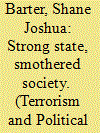

|
|
|
|
|
| Publication |
2011.
|
| Summary/Abstract |
Why have militants in southern Thailand utilized anonymous and at times indiscriminate terrorist violence against civilians? This article gauges three explanations: resource wealth, weak states, and strong states. I argue that terrorist violence against civilians in southern Thailand is partially sustained and largely structured by the considerable institutional strength of the Thai state. This helps sustain the conflict by providing an additional grievance and it structures the form of violence by forcing militants underground and severing their links to civilians. A potential response would be to trim state agencies and scale back the presence of the state in Patani.
|
|
|
|
|
|
|
|
|
|
|
|
|
|
|
|
| 8 |
ID:
103798
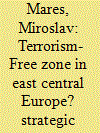

|
|
|
|
|
| Publication |
2011.
|
| Summary/Abstract |
The aim of this article is to analyse terrorism and the phenomena linked to it in East Central Europe. In comparison with a number of other regions of today's world, this area can currently seem to be a relatively "terrorism-free zone." Although the number of terrorist attacks committed in this territory is insignificant, this does not mean that the risk of terrorism is entirely negligible in the region. This text explains some historical determinants of the current situation and describes the consequences both of regime change in the countries in question and of their foreign policy decisions after 1989. I also analyse the importance of East Central Europe as a logistical space for international terrorism (weapons procurement, stays of terrorists, etc.). I characterise the threats of Islamic and Middle Eastern terrorism in connection with the pro-American and pro-Israeli policies of East Central European countries, especially after 9/11, assess the risks posed by the domestic extremist scenes in those countries that have a relationship with terrorism, and take notice of the accusations of terrorism that have been voiced in international politics. On the basis of this data, I then provide an overview of the importance of East Central Europe for the contemporary study of terrorism.
|
|
|
|
|
|
|
|
|
|
|
|
|
|
|
|
|
|
|
|
|